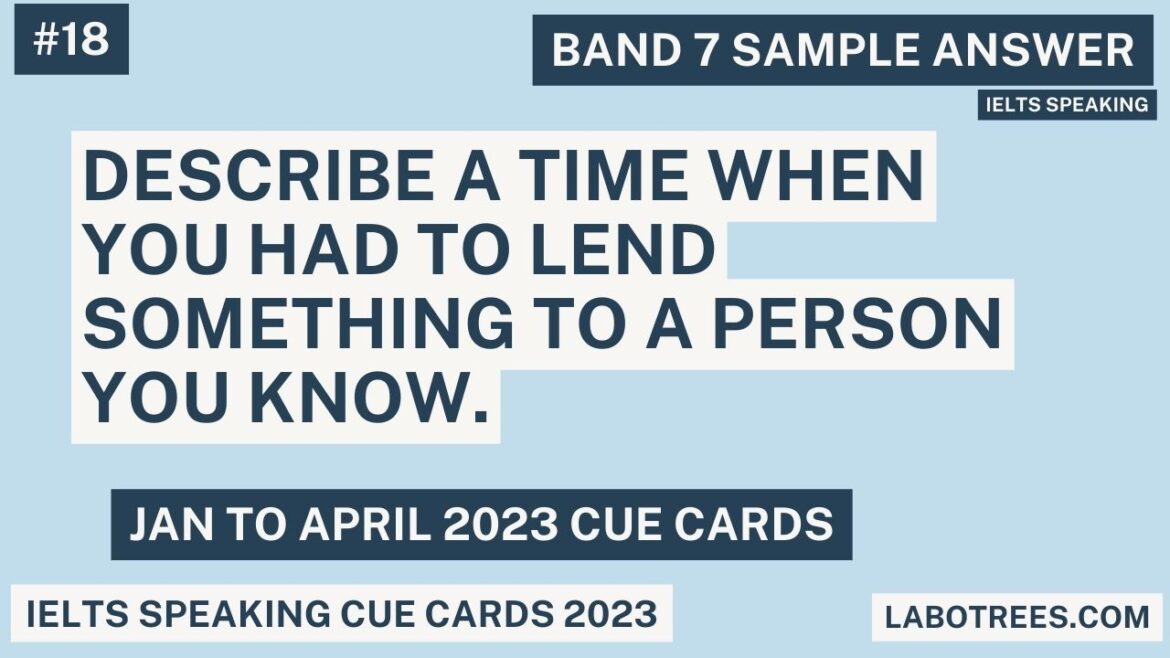Describe a time when you had to lend something to a person you know.
You should say:
What you lent?
When did it happen?
Why did he/she ask to borrow the item?
Explain how you felt about this.
Would you let him borrow it again in future?
- A few months ago, I had to lend my laptop to a close friend of mine, which I had mixed feelings about.
- I own a MacBook that I use for work and personal use.
- It was a big decision to lend it to someone, even someone I trust.
- It all started one evening when my friend called me up, sounding very panicked.
- She had a presentation due the next morning, and her computer had suddenly stopped working.
- She had tried everything she could think of, but nothing was working.
- She asked me if she could borrow my laptop, which was a little daunting for me.
- I knew how important it was for her, and I didn’t want to let her down, so I agreed.
- I had never lent out my laptop before, so it was a new experience for me.
- I handed it over to her, and I remember feeling a little anxious, hoping that she would take good care of it.
- I explained how to use it and told her to be very careful with it since it was my work computer.
- I was relieved when she returned it to me the next day, unscathed.
- She thanked me for lending it to her and told me that it was a lifesaver.
- I felt happy that I was able to help her out in a tough situation, but at the same time, I was glad to have it back in my possession.
- Reflecting on the experience, I think it was a good thing that I was able to lend my laptop to my friend.
- I was happy that I could help her out in a time of need, and I feel proud that I was able to trust her with something so valuable to me.
- However, I don’t think I would lend it again in the future, unless it was for an emergency.
- I’m not sure if I’m comfortable with the idea of someone else using my laptop, even if they’re someone I know and trust.
- In conclusion, lending something to someone you know can be a challenging decision to make, especially if it’s something valuable to you.
- It’s important to weigh the risks and benefits carefully and consider the importance of the item to you and the other person.
- In this case, I’m glad I was able to help my friend out, and it made me feel good that I could assist her in a time of need.
Follow ups:
- What do you think of people who are posting about their personal life on social media?
Some people enjoy sharing their personal life on social media, while others prefer to keep it private. It is a personal choice, and everyone has their reasons for doing so. Some people may feel that it helps them connect with others, while others may do it to seek attention or validation. However, it is important to be mindful of what one posts on social media, as it can have consequences on one’s privacy and reputation.
- How do you feel about sharing research documents online?
Sharing research documents online can be beneficial for the academic community, as it allows for easy access to information and collaboration. However, it is important to ensure that the documents are properly cited and credited to their original authors. Plagiarism can have serious consequences and can undermine the integrity of research.
- Do you think children should share their things with each other?
Yes, sharing is an important value that children should learn from a young age. It helps them develop social skills such as empathy, cooperation, and generosity, which are essential for building relationships and functioning in society.
- Why aren’t children willing to share their things, such as toys?
Children may not be willing to share their things because they feel a sense of ownership over them and may be afraid of losing or damaging them. Additionally, they may not have developed the social skills necessary for sharing and may not fully understand the concept of ownership.
- How can parents teach their children about sharing?
Parents can teach their children about sharing by setting an example themselves and encouraging their children to share with others. They can also provide opportunities for their children to practice sharing, such as sharing toys with siblings or friends. Praising and rewarding children for sharing can also reinforce this positive behavior.
Here is the list of the latest Speaking cue cards which are released every four months.
Click here to see the latest cue cards list
IELTS exam is conducted all around the world and there are two types of exam Academic and General exam. Many people join IELTS preparation classes or coaching centres to improve their English skills. This helps many candidates to increase their band scores. On labotrees, you can IELTS preparation material for free.

